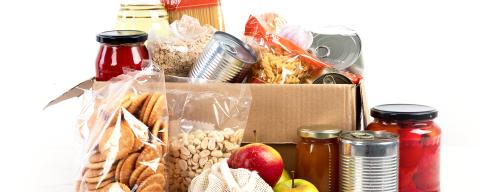SHARE
The United States has an abundant food supply, yet many people lack access to healthy and safe food. Some people in this situation rely on food assistance programs such as food pantries. Food pantries can be a vital source of wholesome food for families and individuals.
Donations of food by local farms, food retailers and consumers to food pantries help provide food to hungry people and can reduce food waste. Although the need is great throughout the year, fall is usually the season when people donate to food pantries through food drives in anticipation of Thanksgiving.
The following guidelines can help you decide what to donate to a food drive or pantry:
- Consider a cash donation. Cash is useful to food banks and food pantries as they can generally buy quantities of food for less. They can also buy the items most needed by their clients.
- It is important that donated food be safe and nutritious as possible rather than just what is in the back of your cupboard. In other words, don’t just “clean out your pantry” and donate food that you don’t want or can’t use anymore unless it meets specific guidelines.
- Purchase food specifically for the food drive. Think about what foods other families like yours might like to eat. Also keep in mind that food pantry and food bank recipients range in age from infants to elderly residents.
- Donate retail-sized food containers. In other words, the size of items you’d pick up at your local grocery store for yourself or family.
- Donate food that is in its original package with the label intact — unopened and not damaged.
- Do not donate food that is past its “best by,” “use by,” or “sell by” date. Although some food is still safe to consume after these dates it is best practice not to donate them.
- If canned food has a sharp dent, a dent deep enough to rest a finger in, severe rust pits, swollen or bulging ends or any evidence of leaking, the food is unsafe to eat and should be discarded and not donated. Canned vegetables and meats with any size dent should be thrown away.
- Because of the risk of botulism in improperly home-canned food and the large variation in the level of safety of the methods used by home canners, food banks and food pantries do not accept any home-canned goods.
Search the New Hampshire Food Bank website for a list of food pantries near you. You can also donate directly to the New Hampshire Food Bank – which serves over 400 feeding programs throughout the state.
Whatever you choose to donate, do it with compassion for your neighbors. Remember, you can make a difference in someone’s life by donating food or money to a local food pantry.
Did you know we have a newsletter on safe food handling for consumers, chidhood centers and food pantries?
Contact
Food Safety Field Specialist
Email: Ann.Hamilton@unh.edu
Phone: (603) 447-3834
Office: Cooperative Extension - Carroll County, Carroll County,


